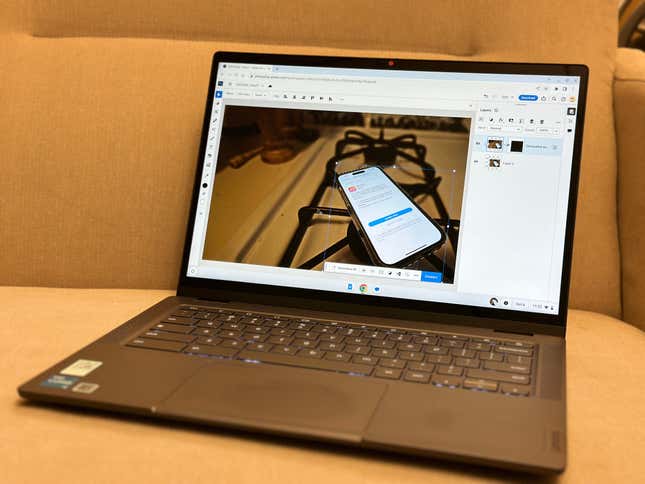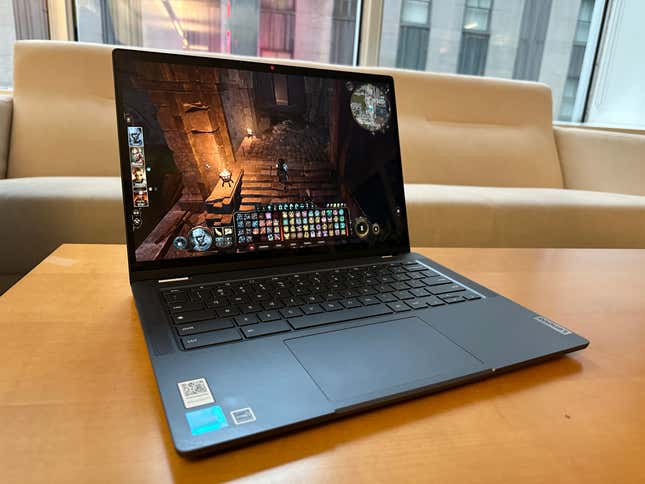For the last 10 years, Chromebooks have remained just what they are. Chromebooks are Chromebooks. Manufacturers release new models every year with slightly updated specs and Google makes minor additions to the ChromeOS-based platform. But despite that, Chromebooks are still low-end budget laptops for folks who only need a device to browse the internet from the comfort of a couch or classroom without breaking the bank.
Then Google came along and didn’t so much change the game, but changed the name. Google is not explicitly saying the newly-dubbed Chromebook Plus is any kind of revolution for its ultra-cheap laptop brand, but the extra moniker implies that these devices are a real step up from what they were before. It’s probably best to think of the “Plus” in Chromebook Plus as indicating basic addition. Google has added a few more software features to its laptops and set minimum specs the company says should “double” the performance of each new model compared to older versions, yet still maintain prices starting at a bare $399.
So just how different are Plus models from previous Chromebooks? Honestly, the average user would struggle to spot the difference between the two. You don’t buy a Chromebook because you want the best processing speeds or the highest refresh rates. To be honest, you buy them because there’s little other choice when trying to find a modern machine that does what Chromebooks do for their price. It’s why they’ve been sold to schools in such large numbers, all you need them to do is run Google Workspace apps and browse the internet. Once a Chromebook starts to cost $600, $700, or $800, then the competition stacks up fast.
One of the Best Deals for Hardware If You Can Stomach the Limitations
The specs on the new Chromebooks are indeed better than most older models. You’ll be guaranteed something like a 12th Gen Intel Core i3 or AMD Ryzen 3 7000 to power it, plus it will contain 8 GB of RAM and 128 GB of storage. If all you want is a Chromebook with those stats starting at $399, stop reading now. There are models from Asus and Acer starting at that price point. If you are looking to take Chromebooks beyond simple browsing and video watching, that’s when you’ll run into constraints.
Then again, Plus isn’t all too big a jump. Despite touting how capable the new Chromebooks are for cloud gaming and photo editing, my old HP X360 Chromebook I bought three years ago is fully capable of running Photoshop on the web and GeForce Now (which has migrated users to the browser version rather than running in a separate Android app). Touted additions like the simple video editor in Google Photos also exist on older machines. There are a few added features to photo editing for Plus models, but Magic Eraser isn’t necessarily a headline hardware feature. The Material You redesign has also landed on older Chromebooks. It looks better than it did before, with softer curves to different windows and a better typeface, but the real question is what makes Plus “plus?”
With few features exclusive to the Chromebook Plus, whether you should purchase comes down to the age-old question of Chromebooks: what will you honestly use your laptop for, and what’s your max budget? If the answer to the first question is anything beyond browsing, watching movies, simple photo editing, and cloud gaming, then you have to look elsewhere. Thankfully, the second question gets answered rather quickly. You won’t find many better deals for new hardware than the Chromebook Plus, as long as you can stomach Google’s proprietary ecosystem.
Navigating the Many Different Chromebook Plus Models
Back when I was a poor college student desperately looking for a laptop device that wouldn’t break the bank, the Chromebook was the best choice I had. I needed something for web and word processing, and it fit the bill. It was me and my tiny 11” Chromebook against the world.
The last Chromebook I purchased for my own use was the $399 HP X360 Chromebook back in 2020. That device had a 10th generation Intel Core i3-10110U CPU and was also a 2-in-1, though to be honest I never found much use for the tablet mode. It had 8GB of RAM but only 64GB of memory, meaning it’s not up to Plus standards. It has also been my go-to device for watching Netflix or YouTube when away from my PC, and it offers a baseline for what’s changed with Plus.
For the purpose of reviewing Chromebook Plus, Google offered media three options for laptops. I went for the $499 Lenovo IdeaPad Flex 5i as I could directly compare it to devices I’ve used the most extensively.
So what has changed? Not too much—at least not much that’s apparent when you first start messing around. The Material You interface is cleaner and more pleasant to look at than it had previously been. The new Dawn to Dark wallpapers are neat, but as of now, there are only two of them, both depicting far-off mountain ranges and a big sky behind them. Having Magic Eraser and Portrait Blur on a laptop format is nice, but to be honest I don’t much like the idea of cropping out people and things from shots, even if they might spoil the view. That’s more of the journalist in me than anything.

The Lenovo IdeaPad is a solidly built machine, and browsing and watching videos is buttery smooth. This Chromebook Plus is sporting an Intel Core i3-1315U, which is more than enough for most people’s daily activity. The 14-inch 16:10 full HD screen does the job at 1920 x 1080 and 300 nits peak brightness.
And the difference three years can make between CPUs can be eye-opening. There are not many services built to benchmark Chromebooks, but the IdeaPad scored 235 on the online benchmark program JetStream 2. That site runs several JavaScript and WebAssembly programs in-browser and rates a device based on how quickly it executes them. Newer hardware will always do better on up-to-date websites, though the IdeaPad scored much higher than the 122 scored on the three-year-old HP. The Chromebook Plus’s score was equivalent to a M1-powered MacBook Air from 2020.
On GeekBench 6, the Chromebook Plus scored an 1850 single-core and 5105 multi-core. It’s actually rather equivalent to the $750 Dell Inspiron 14 2-in-1, another budget laptop, though of course the IdeaPad (nor any Windows or ChromeOS device, to be frank) has no chance trying to beat a $1,300 15-inch MacBook Air, at least in terms of pure power.
That being said, 8GB of RAM is a good baseline for a cheap product like the Lenovo IdeaPad running the barebones ChromeOS, but it can struggle with the more demanding apps that theoretically work on the Chromebook, like running games through the Steam integration. There is no 16GB version available, Lenovo does have a “Gaming Chromebook Plus” releasing alongside the Flex i5, but that’s not currently available in the U.S. Most laptops struggle to run Windows without 16 GB of memory, but for Chromebooks, it’s certainly enough. Mind you, there is no 16GB version available. Lenovo does have a “Gaming Chromebook Plus” with more RAM that’s releasing alongside the Flex i5, but it’s not currently available in the U.S.
The promised 1080p webcam was a rather nice touch on a sub-$500 machine. It’s better than what you get on a full Windows-based budget laptop like the new, $800 Microsoft Surface Laptop Go 3 (a device that’s really stretching the definition of “budget”). The handy bottom shelf controls let you instantly control background blur, noise cancellation, and improved lighting to artificially make your mug a bit brighter. The noise cancellation worked well enough to ignore the sound of traffic outside, but it won’t stop all the louder ambient noise in the vicinity.
Occasionally I had issues where the trackpad on the IdeaPad spazzed out. This was more obvious when I was playing a point-and-click-heavy game like Baldur’s Gate 3 without using a mouse. The sound is what you expect from just two, two-way stereo speakers on a budget laptop.
Trying to Entice New Chromebook Users

To entice new users, Google is offering Chromebook Plus buyers a free three-month subscription to Adobe’s somewhat pared-down version of Photoshop on the web plus three months of GeForce Now’s priority tier. Both are cloud-based applications running specifically in-browser, which is exactly where Google wants you to spend your time.
Photoshop on the web is user-friendly, and it contains all the tools most people would use, such as your usual light adjustment and cropping tools. It’s missing several features of the desktop version, and anybody jumping into the web-based editing tool won’t be able to play around with different filters. The web version of Photoshop also includes the generative expand and generative fill AI tools, which on paper are neat toys but they can create some strange results in practice. If that all sounds good to you, that three-month trial will still fly by in no time.
The best new feature coming to Chromebook Plus is the File Sync feature. While 128GB of storage space is better than some previous Chromebook models at base, it’s still not a lot by any stretch. Chromebooks rely on Google Drive for pretty much all other storage, which makes it a pain if you try to use it without a wifi connection. With File Sync enabled, Chromebook Plus shares your Drive data onto your device whenever it finds an internet connection. As long as you’re not dealing with a full-up Drive, the feature does offer a little more peace of mind if you’re taking your Chromebook on the road.
If all you wanted to know is if Photoshop on the web runs well on a Chromebook, then yes, it does. Let’s be fair, you’re not buying a Chromebook expecting to run a high-end photo or video editing tool. The other side of the Chromebook Plus is the emphasis on cloud gaming. Geforce Now is a good service by itself, and it does the job on Chromebook Plus. I’ve played several hours of the new 2.0 version of Cyberpunk 2077 and Baldur’s Gate 3 through my Chromebook and it does the job. That’s impressive when you consider that Cyberpunk was taxing some of the better PC builds when it first came out.
The thing is, even if GeForce Now streams at 60FPS up to 1080p resolution, you simply will not get the same graphical fidelity if you were running it off a dedicated machine with a higher refresh screen, no matter how much you crank up the settings in-game.
Because that’s the point of Chromebooks, and it always has been. They’re good enough. They do the job. They don’t cost you an arm and a leg. Also, Google now promises it will support Chromebooks with 10 years of software updates, so you can feel a bit more safe the device will stick around for a while.
If you already own a relatively recent Chromebook, there are very few reasons to switch to a newer model. Nothing about the Chromebook Plus dramatically changes how you use your ChromeOS device, not the least because many of the UI features are being backported to older models. But if you’re on the lookout for a cheap laptop model, and you don’t mind being beholden solely to Google’s ecosystem, then Chromebook’s minimum specs for the minimum price are still a fair bargain.
Trending Products














